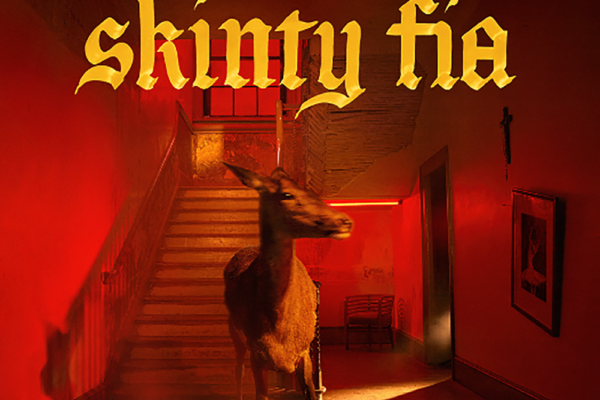It’s never a good idea to start out an album review by admitting you’ve never been a fan of Artist X, but I’ve never been a fan of Panda Bear. It all started in the early two-thousands when everyone simultaneously became aware of his band Animal Collective, only to get worse when everyone I knew made listening to “My Girls” an endurance test—although I will say that Merriweather Post Pavilion is a great name for an album. Eventually, the song grew on me, but thick-headedness prevented me from ever really getting into them, or Panda Bear himself. A few listens of TomBoy never really got me, and I never had any reason to explore the back catalogue.
When you start out an album review with a sentence such as the one here, coupled with the explanation given, there are only two ways that this review can go. Either it confirmed my distaste, or exceeded my expectations:
The first thing I noticed about this new album, Panda Bear Meets the Grim Reaper—another great album title—was the nautical thread that runs throughout the album. “Davy Jones’ Locker” is obvious, but “Butcher Baker Candlestick Maker” comes from the old folk rhyme “Rub a Dub Dub,” and those are the three men who sailed out to sea. The Colossus of “Shadow of the Colossus” was a statue that straddled the harbor in ancient Rhodes (our Statue of Liberty is based on this statue). “Mr. Noah,” being Panda Bear’s real name, is also an old folk song that Dave Van Ronk did on Folksinger about another sea-faring Noah. “Lonely Wanderer” contains samples from Debussy who wrote “La Mer.”
Just from the names of the songs, you begin to paint a picture of this album that the songs themselves confirm. I wasn’t the first person to notice the melodic similarities in his voice to Brian Wilson circa Pet Sounds and Smile. What this all appears to me is a maturing of his melodic sensibilities from the time of MPP, and even TomBoy from four years ago. “Crosswords” is probably my favorite example of this on the album, but the repetition of “really shouldn’t bring that other guy” on “Butcher Baker Candlestick Maker” is reminiscent of “Don’t Talk”’s coda on Pet Sounds.
The other guy if you’re wondering is God, which says a lot about the tone of the album. “Tropic of Cancer” delves into his father’s cancer, “sick has to eat well” he sings over a beautiful Harp arpeggio, sympathizing with the very cells that are killing his father. “And you can’t get back, you won’t come back, you can’t come back to it,” he sings in the chorus, perhaps meaning life, as he asks on “Lonely Wanderer,” if it was all “worthwhile.”
The trio of songs that end the album all deal with the father/son relationship, “Principe Real” is a famous garden in Panda Bear’s adopted Portugal, but also translates to Royal Prince, “Selfish Gene” is also the name of a book by Richard Dawkins on genetics, and the last one is a stretch, but I’m thinking the pun is “Acid Wash” Genes. Pun might be too light a word for perhaps the most melancholy song on the album, a modern “Sloop John B,” except the voyage is into death. “Graph the spasm/I’m past” are the words that end the album.
As with most of Panda Bear’s efforts, the album reads like a sound collage piece from the Back to the Future series—part 50s, part 80s, part 2015. The best songs on the album are those that edit the impulse to use all tracks that digital mixing has allowed songwriters. “Crosswords” may have just four or five layers. Most of “Tropic of Cancer” might have just three.
“Mr. Noah” on the other hand starts off with a track that I’m more than positive is dogs in a pound. The whole thing is so claustrophobic that you can’t really appreciate the heart of the song, which if you strip away the layers is really quite catchy. The same could be said for “Come to Your Senses.” The real triumph on the album is “Boys Latin,” which is one of the instances where the sonics serve the song, and make it better.
The one thing I appreciate about this album is the nod to classical music, which goes underappreciated in every generation. Two of the three samples on this album come from the Romantic period of music, and the Debussy is a favorite of mine. “Boys Latin” feels like a Gregorian chant, with the echo and slow moving melody giving it this aura about it that feels spacious. There were times on the record where you wondered if he was playing with micropolyphony like the modernists, but that might just be a side effect of the modulation throughout.
So Panda Bear exceeded my personal expectations. It’s a mature effort, but there is still some room for musical growth, and that’s all right. Panda Bear Meets the Grim Reaper is a great album, and it has given me pause to revisit his entire career.
Article by: Christopher Gilson




